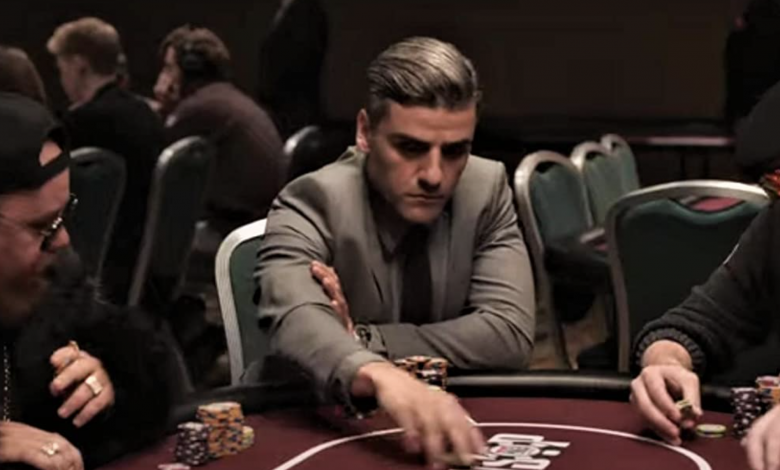The Card Counter Review – Paul Schrader’s Small Bet, Small Win

Karenna Umscheid ‘25 / Emertainment Monthly Staff Writer
Paul Schrader’s latest is not the winning hand at a poker tournament. It’s a $30 win off a scratch ticket. It’s better than nothing, but far from what it could have been.
Spoilers ahead.
A haunted man in an empty room. William Tell (Oscar Issac) refuses to make an impression or leave an imprint. He pays for hotel rooms in cash and removes every piece of art, covers every piece of furniture in cloth. He plays rounds of blackjack because he’s skilled at counting cards. He only bets small, in order to escape every casino’s watchful eye.
If First Reformed was a dark and existential reckoning with our future, The Card Counter is a gutting reckoning of our pasts. However, the former was far more ambitious. Now, it feels like Paul Schrader is almost playing it safe. There is nothing surprising in this film. Not the nudity, nor the violence, or general disturbing subject matter could make this as poignant or impressive as First Reformed. The most disturbing scene is the one where no characters are shown, only noise and an empty doorway. The film doesn’t bet awfully big, though with the performances and the gambling backdrop, it really should have. It’s disappointingly far from Schrader’s best, but it’s not a bad film by any means.
In the serious crime drama Casino, and even the rambunctious comedy The House, one thing is clear: the gambling is the high. There may be a low after, something of getting caught or losing wealth, but the glitz and glamour of the casino was always the highest point. To William Tell, there is no glory or celebration in the game. Even when he wins, he only wins small. He doesn’t celebrate, he just moves to the next casino.
He leaves the lightest trail possible in his endeavors, but never leaves his past completely. When he encounters Cirk (Tye Sheridan), nicknamed “the kid”, he finds a tie to his evil and torturous past he can’t break. Like another Paul Schrader character, he aches to help this young person. He consistently encourages Cirk to visit his mother, and eventually resorts to violence and intimidation to force him to. He can’t escape his past. He can’t outplay it and he can’t gamble it away.
Poker opens himself up to more. He meets La Linda (Tiffany Haddish), an acquaintance who runs a stable – a group of gambling investors. He tells her she woke something in him. He begins to gamble with the future.
Anonymity is essential for a man plagued by the demons following William. Adorned with a slow tracking shot, he paces down an aisle of sponsors, politely but not excitedly greeting acquaintances. But anonymity is impossible today, not with Google Earth, not with celebrations of military heroes and not when American-caused atrocities are swept under the rug. William’s search for anonymity is eroded. Through goodness, in his relationship with La Linda. She opens him up to poker tournaments, to human connection. But it’s also eroded through his connection with Cirk, bringing the past up constantly. He can’t shake it off.
The Card Counter is largely metaphorical, it begs little deep pondering. Since his military involvement and imprisonment, there has always been a barrier between him and healthy human connection. In closing the gap and holding hands with La Linda under the lights, he seems to have formed a genuine bond. He plays blackjack because it’s a game of the past, he tries to conquer both. His entanglement with Cirk and his history catches up disastrously. He doesn’t finish his last poker game, his past interrupts. The division between him and a strong human connection has always existed, he never was able to fully break it down. The last shot drills this in. The Card Counter was not especially subtle in its metaphors.
To the dismay of many Paul Schrader fans, this is a less ambitious, less interesting attempt from a writer and director who could do so much more. In such a layered and fascinating environment, The Card Counter could have been so much more ambitious than it was. But the metaphors felt painfully obvious, the plot almost formulaic. It’s not a bad film by any means. Oscar Issac is great, as is Tiffany Haddish in a delightful dramatic turn, as is younger actor Tye Sheridan. Where First Reformed was brilliantly difficult-to-understand, The Card Counter feels far too easy to think about. It follows similar steps in a lonely man’s diaries and drinking in an empty room, but it lacks the desire to be more than a long monologue without much more to say than Schrader’s already said. It’ll keep your attention, but it’ll leave you wanting a lot more.